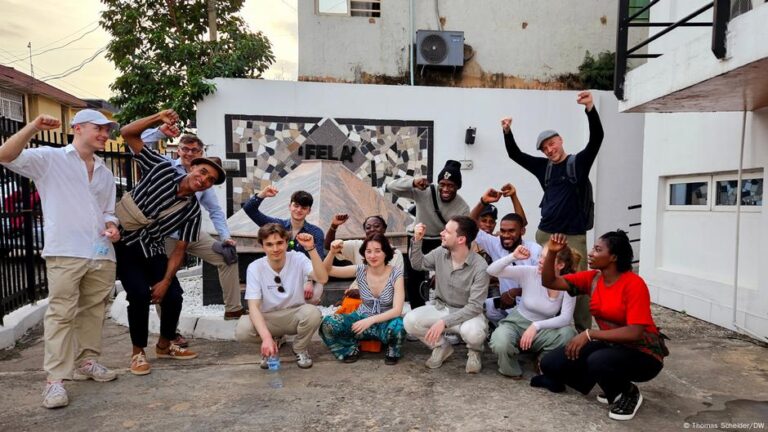When young musicians from Nigeria and Germany took to the stage at a Beethovenfest concert in Bonn on September 11, it was clear that the audience was witnessing the culmination of an incredible journey. Afrobeat rhythms pulsed alongside clarinets and violins, Nigerian protest songs merged with Beethoven’s”Egmont.”
The concert, with its musical mix of influences, was the culmination of Campus Project 2025 — a collaboration between BeethovenfestBonn, the German Youth Orchestra and DW that’s been running for over two decades. Each year, the project brings together young musicians for a cultural and musical exchange.
This year, six young German musicians met six Nigerian counterparts to experiment and connect, while under the guidance of Afrobeat collective BANTU. The goal of the project was to bridge disparate musical traditions while fostering cultural exchange in the process.
From Lagos to Bonn
The group first met in March 2025 in Lagos, Nigeria. For many of the German participants, it was their first time in Africa. “This was a great opportunity to learn new things and meet new people from other cultures,” 20-year-old German clarinetist Luis McCall told DW during the trip.
McCall met fellow musician Mary Ifeoluwa from Lagos who studied at the prestigious Muson Centre, one of the best schools for classical music on the African continent. Like many others, she started learning church music and later studied classical violin.
“We love music in our family, but it is not allowed to be studied as a career,” Ifeoluwa told DW at the start of the project. “I’ve stuck to my music, but it wasn’t easy.”
The 12 young musicians joined members of the BANTU band for an intensive week that began with rehearsals of the music collective’s fiery Afrobeat protest song “Ten Times Backwards,” studied Beethoven, and began experimenting with Cassie Kinoshi’s score, then still a work in progress.
The trip to Lagos wasn’t only focused on practicing — the group explored the legacy of one of Nigeria’s most famous musicians, a man widely considered to be the father of Afrobeat: Fela Kuti. They visited Kuti’s New Afrika Shrine nightclub, which he founded in 1972. Over the years, it played host to stars such as Stevie Wonder and Bono — but more importantly, it’s where the roots of Afrobeat lie.
Kuti was celebrated worldwide in the 1970s for his pulsating sound that combined jazz, highlife and pop — and was always political in nature. The exploration of Kuti’s music helped give the project deeper roots, putting it amidst a tradition in Nigeria where music has always carried the power to inspire and provoke.
A type of homecoming
The group met again in September when the Nigerian musicians arrived in Bonn, Germany, just in time for the annual Beethovenfest. After sightseeing and plenty of rehearsals, the group presented a final concert on September 11 during the festival.
Beethoven’s “Egmont” Overture was placed in dialogue with Fela Kuti’s “Colonial Mentality,” the Afrobeat pioneer’s critique of post-colonial mindsets. Works by BANTU added a contemporary feel, while German and Nigerian folk songs were reimagined by trombonist Isaiah Odeyale. The ensemble also performed Mauricio Kagel’s “10 Marches to Miss the Victory,” a piece that underscores themes of pacifism and artistic freedom. The full concert can be viewed here on DW Classical Music.
The evening was especially touching for British-Nigerian composer Cassie
Kinoshi whose work “odò (river)” debuted. Kinoshi’s father was born in Nigeria and moved to the UK, where she was born. For Kinoshi, the commission was a chance to explore her African roots: Her piece for chamber ensemble features the “talking drum” of West Africa, a versatile percussion instrument that can mimic human speech.
The project was also an opportunity for singer-songwriter Adé Bantu to reflect, as well. Bantu’s father is Nigerian, and his mother German. At the age of four, he moved to Germany, where he later launched his career before returning to Nigeria to search for his roots.
“We can call multiple places home at the same time. I am just somebody who feels very much at home in Nigeria and in Germany — and I don’t feel like I have to compare both,” explained Bantu.
A last stop in the capital
The journey continued on September 12, when the musicians traveled to Berlin and performed their program at the Humboldt Forum. While there, the group confronted another layer of history via the museum’s controversial collection of Benin Bronzes. In 2022, Germany returned the ownership rights to the Benin Bronzes to Nigeria.
Some artifacts were returned, while others remain on display but are now officially on loan from Nigeria to the Berlin museum. For bandleader Adé Bantu, the restitution carried personal weight. He felt “deeply touched by the fact that these works now belong to us Nigerians.”
As for the Campus Project 2025, many can agree it was a success with musicians coming together as strangers, and leaving as one participant said “as family.”
As German clarinetist McCall said, “My world view expanded. I learned a lot about the country, the people, and the political conflicts. And this relaxed approach to making music — just going for it. I will take this approach to music with me.”
To learn more about the project, check out the DW film:


